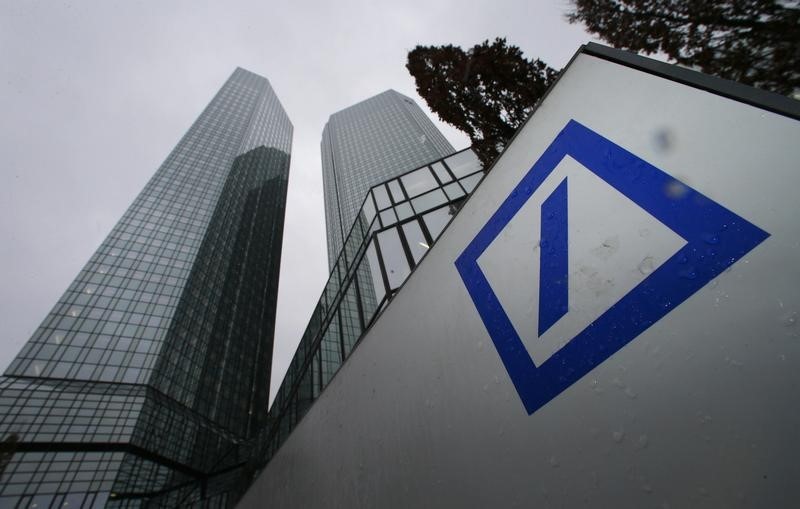By Thomas Atkins and Jonathan Gould
FRANKFURT (Reuters) - Deutsche Bank (DE:DBKGn) will cut 200 billion euros ($217.5 billion) in investment bank assets and exit a tenth of the countries in which it operates as part of a restructuring program designed to boost earnings and cut risk.
After sticking with its costly universal banking model in the aftermath of the financial crisis, Germany's largest bank is under pressure from investors to follow rivals such as UBS (VX:UBSN) and Credit Suisse (VX:CSGN) by culling unprofitable operations.
Shares in the German lender dropped by more than 3 percent in early trade, the biggest faller among European banks (SX7P), as investors doubted whether co-chief executives Anshu Jain and Juergen Fitschen would meet their new targets.
"There are 2020 targets and savings/investment plans which we and the market will take with a grain of salt, given their chequered history," said Omar Fall, an analyst with Jefferies International.
The strategy announcement comes a day after Deutsche reported a 50 percent drop in first-quarter earnings, with hefty legal charges eroding gains in investment banking revenue. British and U.S. regulators fined the bank a record $2.5 billion for manipulating benchmark interest rates, with the potential for further fines from other market investigations.
"Please wait, in just a few months we will be back with strong details," Jain told analysts seeking more details about the plan. The bank said it would give further updates in 90 days.
POSTBANK SALE
As part of the overhaul, Deutsche will sell its Postbank (DE:DPBGn) retail division via a stock market offering by the end of 2016 and close up to 200 branches -- more than a quarter of its retail network -- by 2017.
The reconfiguration is expected to cost a total of 3.7 billion euros and produce annual cost savings of 3.5 billion euros. The bank did not say how many jobs would be lost or which countries it would exit.
In its investment bank, the group's main profit driver, it will pull back its dealings in repurchase agreements and swaps, which are used by banks and companies to hedge risk, and redeploy up to 70 billion euros in leverage to other trading areas such as equities and emerging market debt.
While it switches gears in its investment bank, Deutsche plans to expand its asset and wealth management business by up to 10 percent a year until 2020 and boost the number of relationship managers by 15 percent in key markets.
Asked for more detail on specific aspects of the plan, Chief Financial Officer Stefan Krause told analysts: "We really have no detailed planning upon which I can base statements at this time."
The plan, which includes spending up to 1 billion euros on digital technology, is also designed to boost the group's leverage ratio to least 5 percent from 3.4 percent at the end of the first quarter. Deutsche is also aiming for a dividend payout ratio of 50 percent in 3-5 years.

The company said it would step up investments in India and China but reduce the number of its foreign offices to about 63 from 70.